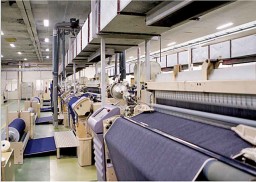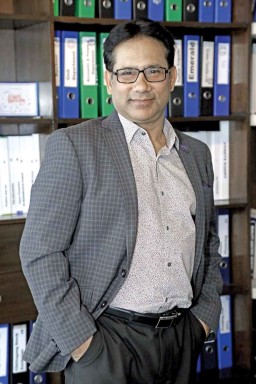
As the business gets more competitive, with compliance needs getting stringent, a reliable integrated setup is important to meet international expectations and many big groups have invested in textiles to reduce dependency on imported fabrics and have a better control over the supply chain. Envoy Group is among the handful of companies who have been able to successfully complete this transition from apparel to fabric manufacturer.
The leading apparel and textile conglomerate which ventured into garmenting with a setup of less than 50 machines presently has more than 7,000 sewing machines, divided into 15 garmenting units, contributing US $ 150 million to the group turnover of US $ 220 million. The group also has a washing unit and fabric manufacturing facility, besides diversification in freight forwarding, trading, business solutions, banking and hospitality.

“We are already satisfying 85 per cent of our knit fabric requirement through locally manufactured fabric but the figures are exactly opposite in case of woven fabrics, with over 70 per cent of the fabrics being imported from countries like Pakistan, India, Taiwan and China,” shares Abdus Salam Murshedy, Managing Director, Envoy Group, a firm believer of import substitution. “We are already satisfying 99 per cent of our industry’s accessory requirements and sourcing only a negligible amount from outside, which many people don’t know about,” he adds.
Foreseeing the opportunity in the denim bottom manufacturing segment of the country which was greatly dependent on fabrics from China and India, company Chairman Kutubuddin Ahmed, and Murshedy setup Envoy Textiles Ltd. in the year 1999. Spread in an area of around 50 acres with an annual production capacity of 24 million yards, manufacturing a wide range of denim fabrics – 4.5 oz to 14.75 oz in cotton, cotton polyester, cotton linen, tencel etc., Envoy will soon double its denim manufacturing capacity to 50 million yards per annum.
Under the proficient supervision and guidance of the management, the company has specifically been making conscious and consistent efforts to move into the mid- to high-end segment, and vacate the lower end of the spectrum. “For this, our focus has been on machinery, personnel, product development, and very importantly, moving into denim fabric exports. Export is our way of ensuring that we are competitive in the world market,” believes Murshedy.
Envoy Group has not only relied on automating its apparel manufacturing units but is also coming up with a ‘green’ factory with 60 sewing lines for producing multiple products. Spread over an area of around 10 acres, the unit will have a washing plant as well as an ETP plant. The investment in the project would be about US $ 32 million and is projected to hike Envoy Group’s garmenting turnover to US $ 200 million by the end of 2016.






